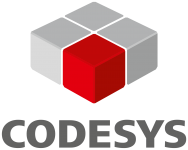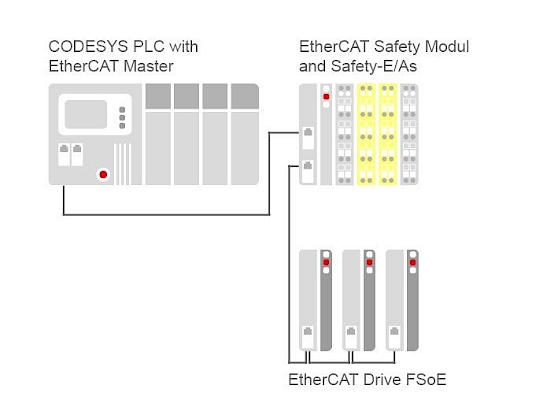Product Description
The TÜV certified product allows to extend any CODESYS project with an EtherCAT controller with CODESYS EtherCAT Master stack for the development of safety functions with TÜV certified safety logic modules by Beckhoff and digital FSoE I/O modules and analog TSC input modules in the EtherCAT network. The extension with safety-specific editors and configurators is integrated seamlessly into the CODESYS Development System and the CODESYS EtherCAT configurator. It enables cost effective and scalable realization of simple safety applications with zero sytem integration or adaptation effort and low acceptance expenditure. The product is aimed at users and at device manufacturers who do not intend to develop their own safety controller and require only limited safety functionality.
Safety level up to PL-e according to DIN EN ISO 13849 and up to SIL3 according to IEC 62061/61508, depending on input and output devices and programmed logic.
Simplified acceptance by Limited Variability Programming (LVL) according to ISO 13849 and IEC 62061.
Logic modules: EL6900 or EL6910 as EtherCAT camp (TwinSAFE-Logic), or EK1960 as EtherCAT coupler (TwinSAFE-Compact Controller) by Beckhoff, or EL1918, EL2912, EL2911
Digital SIL3 I/O-modules: FSoE modules (Failsafe over EtherCAT) by any manufacturer installed from EtherCAT description files.
Analog SIL2 input modules: 10 TSC modules (TwinSAFE SingleChannel) by Beckhoff: EL3124-0090, EL3174-0090 (differential), EL3214-0090 (for resistance sensors), EL3314-0090 (for thermal element), EL3356-0090 (for weight cell/resistance bridge); and encoders/givers EL5001-0090 (SSI), EL5021-0090 (Sin/Cos), EL5032-0090 (EnDat2.2), EL5101-0090 (incremental differential RS422), EL5151-0090 (incremental)
Operation functions and fieldbus configuration on the standarc controller can be changed without impact on the safety functions of the safety logic module.
Standard signals can be exchanged with the EtherCAT controller: standard input signals for comparison with TSC values, signals from/to the standard application.
Multiple safety logic modules within an EtherCAT network are possible.
Groups: Monitoring of multiple safety areas by one safety logic module supported by dividing the safety application into “groups” of I/O modules with related logic in an IEC 61131-3 POU in FBD language. Each group is started, stopped, diagnosed and error acknowledged separately by the standard application.
Optional devices: If a safety area is not present in the machine, EL6910 and EK1960 allow to deactivate the corresponding group by online command without chaning the application (permanently, temporarily, passivated).
Requirements
Programming System | CODESYS V3.5 SP16 Patch 3 (64 bit, 32 bit), or a version listed in column “Compatibility” under “All versions” Do not use together with GIT or SVN. |
Programming Platform | Windows 10 (64 bit) The versions maintained by Microsoft are supported. |
Runtime System | CODESYS Control V3.5 SP4 (or higher) |
Additional Requirements | License for CODESYS EtherCAT Master on the controller |
Supported Devices |
Note: Use the project “Device Reader” to find out the supported features of your device. “Device Reader” is available for free in the CODESYS Store. |
Restrictions | No configuration of SRA-parameters; no installation of further TSC modules from description files; no PROFIsafe support |
Licensing | Single Device License: The license can be used on the target device/PLC on which the CODESYS Runtime System is installed. Licenses are activated on a software-based license container (soft container), which is permanently connected to the controller. Alternatively the license can be stored on a CODESYS Key (USB-Dongle). By replugging the CODESYS Key, the license can be used on any other controller. Note: In demo mode, the software runs for two hours without a license. SAFE STATE WILL BE ENTERED AFTER EXPIRY OF TWO HOURS! |
Required Accessories | Optional: CODESYS Key |
Products
The CODESYS Development System is the IEC 61131-3 programming tool for industrial control and automation technology, available in a 32-bit and a 64-bit version.

CODESYS Control RTE SL
CODESYS Control RTE SL is a real-time software PLC for PC-based industrial controllers under Windows - programmable with the IEC 61131-3 development System CODESYS.

CODESYS Runtime_Key
The CODESYS Key is a USB dongle for secure storage of your software licenses based on CodeMeter® technology.
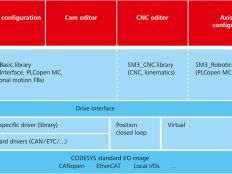
CODESYS SoftMotion SL
CODESYS SoftMotion is an additional option for CODESYS compatible SoftPLC systems. CODESYS SoftMotion extends the functional scope of these systems from a purely logical controller to a motion controller, optionally also with CNC and robotics support.
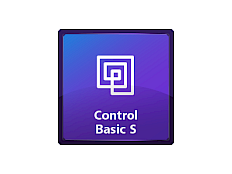
CODESYS Control Basic S
The application-based CODESYS Control Basic S license is specially designed for the smallest applications with up to 64 I/O channels and an application size of up to 512 kB and can be used on all Control SL products without restrictions.
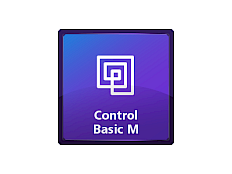
CODESYS Control Basic M
The application-based CODESYS Control Basic M license is specially designed for applications with up to two CANopen or Modbus fieldbus instances. It contains 128 I/O channels and supports an application size of up to 1 MB and can be used on all Control SL products without restrictions.
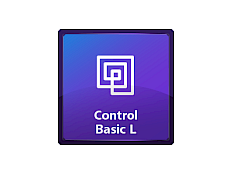
CODESYS Control Basic L
The application-based CODESYS Control Basic L license is specially designed for applications with up to two CANopen or Modbus fieldbus instances. It contains 256 I/O channels and supports an application size of up to 3 MB and can be used on all Control SL products without restrictions.
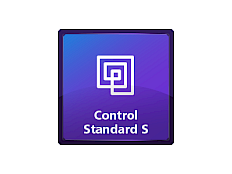
CODESYS Control Standard S
The application-based license CODESYS Control Standard S is specially designed for applications with an Ethernet-based fieldbus instance. It contains 512 E-A channels and supports an application size of up to 3 MB. It can be used on all Control SL products without restrictions.
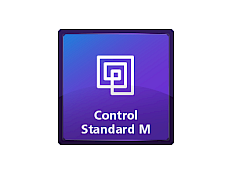
CODESYS Control Standard M
The application-based CODESYS Control Standard M license is specially designed for applications with an Ethernet-based fieldbus instance. It contains 1024 I/O channels and supports an application size of up to 5 MB and can be used on all Control SL products without restrictions.
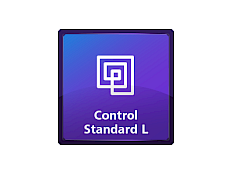
CODESYS Control Standard L
The application-based CODESYS Control Standard L license is specially designed for applications with two Ethernet-based fieldbus instance. It contains 2048 I/O channels, supports an application size of up to 6 MB and can be used on all Control SL products without restrictions.
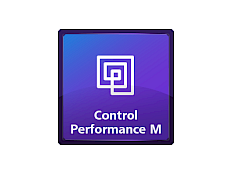
CODESYS Control Performance M
The application-based license CODESYS Control Performance M is specially designed for applications with highest performance requirements. The MultiCore functionality enables a significant reduction of the task jitter, furthermore the license contains two Ethernet-based fieldbus instances, 4096 I/O channels and supports an application size of up to 8 MB. It can be used on all Control SL products without restrictions.
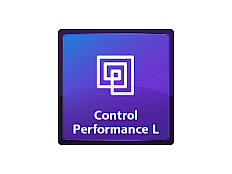
CODESYS Control Performance L
The application-based license CODESYS Control Performance L is specially designed for applications with highest performance requirements. The MultiCore functionality enables a significant reduction of the task jitter, furthermore the license contains four Ethernet-based fieldbus instances, 8192 I/O channels and supports an application size of up to 10 MB. It can be used on all Control SL products without restrictions.

CODESYS Control for Linux ARM SL
An IEC 61131-3-compliant SoftPLC for Linux/ARM-based industrial controllers.
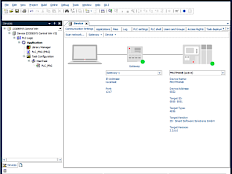
CODESYS Control Win SL
CODESYS Control Win SL is an IEC 61131-3 SoftPLC for PC-based industrial controllers (PLCs) under Windows with soft real-time properties.
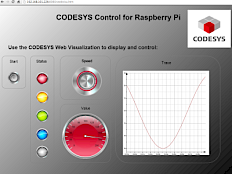
CODESYS Control for Raspberry Pi MC SL
CODESYS Control for Raspberry Pi MC SL is an adapted CODESYS Control runtime system for Raspberry Pi with more than one core on a single CPU.
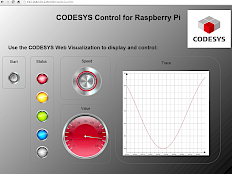
CODESYS Control for Raspberry Pi SL
CODESYS Control for Raspberry Pi SL is an adapted CODESYS Control runtime system for the Raspberry Pi (PLC extension), for non-commercial use.
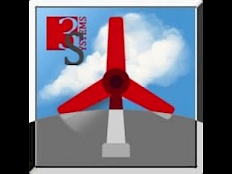
IEC 60870-5-104 Server
The Telecontrol package contains an IEC 60870-5-104 server that can be fully activated with this license. Without purchasing a license, the IEC 60870-5-104 server SL runs for 30 minutes without any functional restrictions (demo mode).
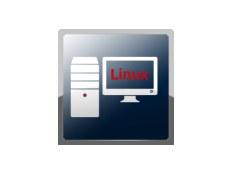
CODESYS Control for Linux SL
CODESYS Control Linux SL is an IEC 61131-3-compliant SoftPLC for PC-based industrial controllers running on Linux with soft real-time properties.
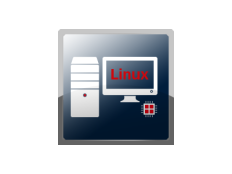
CODESYS Control for Linux MC SL
CODESYS Control Linux MC SL is an extension of CODESYS Control Linux SL – an IEC 61131-3-compliant SoftPLC for PC-based industrial controllers running on Linux with soft real-time properties.
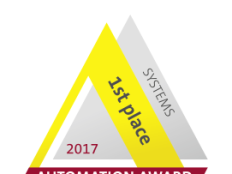
CODESYS Control for PFC200 SL
This product allows users to program different models of the WAGO PFC200 controller by using the free CODESYS Development System (V3).
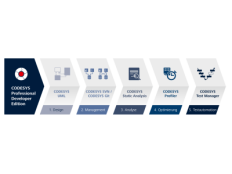
CODESYS Professional Developer Edition
A one-year license for all tools of the CODESYS Professional Developer Edition (PDE). The CODESYS Professional Developer Editon is an add-on product to the CODESYS Development System.
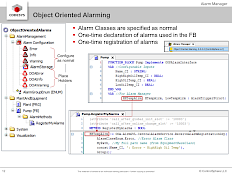
Object Oriented Alarming Library
The Object Oriented Alarming (OOA) Library of ControlSphere Engineering enhances the CODESYS Alarm Manager to allow objects (Function Blocks) to create and activate their own alarms.
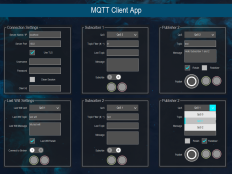
CODESYS IIot Libraries SL
The software package “IIoT Libraries SL” contains libraries for “IIoT communication” and libraries for reading and writing of data structures.
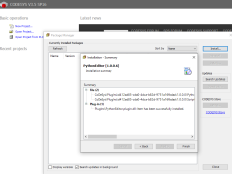
Python Editor
“PythonEditor” as annual subscription facilitates the automation of development activities via the ScriptEngine integrated in CODESYS using sophisticated IntelliSense technology.
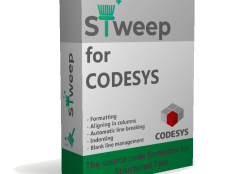
STweep Formatter for CODESYS
The STweep formatter for CODESYS is a source code formatter for Structured Text. With STweep you can enforce a consisting code style based on your preferences! “STweep is a must have tool for developers and companies who want to speed up development.”
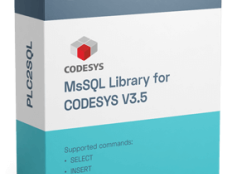
MsSQL Library SL
The MsSQL library helps to read and store your data directly to Microsoft SQL Server without middleware (such as OPC). Without purchasing a license (just download) the library runs for two hours without functional limitations and shuts down automatically (demo).
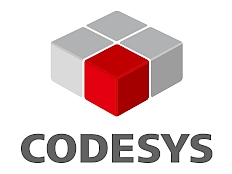
PDE Network License (5 users)
A one-year floating license for all tools of the CODESYS Professional Developer Edition (PDE). The CODESYS Professional Developer Editon is an add-on product to the CODESYS Development System. The add-on product supports companies that develop software for machines and systems professionally and in teams. The CODESYS Professional Developer Edition subscription combines all CODESYS add-on solutions listed below for professional IEC 611313-3 application development.
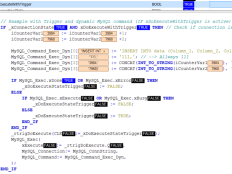
MySQL Library SL
This Library allows you to connect your CODESYS v3.5 application to a MySQL-Sever database to read and write data from it. Without purchasing a license (just download) the MySQL Library SL runs for 30 minutes without functional limitations and disconnects automatically (demo).

JSON HTTP Client Library
This library contains functions to create JSON data from CODESYS variables to post this as HTTP message to a (web-)server.
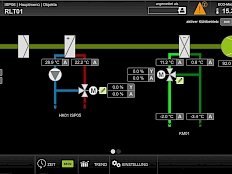
HVAC Building Automation Package SL
HVAC (Heating Ventilation and Air-Conditioning) functional components and HTML5 visualisation.

Universal Modbus Client/Master SL
With the easy-to-use Modbus function blocks, values can be read and written via Modbus TCP, Modbus UDP or Modbus RTU. In addition, Modbus RTU over TCP and Modbus RTU over UDP are supported. Without purchasing a license (just download), the Universal Modbus Client Master SL runs for 30 minutes without functional limitations (demo).
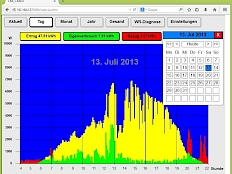
Home Energy Control
Home-Energy-Control, bir konut binasının elektrik enerjisi dengesini kaydetmek ve analiz etmek için kullanılan bir yazılımdır. Bir PV Santrali'nin geliri, kendi tüketimi ve satın alınan enerji ile karşılaştırılabilir.

Dweet Pro Library SL
This is an unofficial library for use with the dweet.io and dweetpro.io service. It’s developed to use with the main features as sending and receiving dweets. The library supports a secure connection between the service and the PLC controller. TLS encrypts all traffic. The dweet service also offers the opportunity to protect your “Thing” with a secret key.

CODESYS Academy Training V3 Advanced
Organizer / Trainer: CODESYS GmbH / Ralph Holz
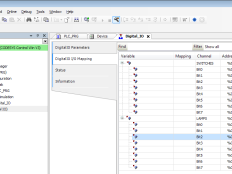
CODESYS Academy Training V3 Essentials
Organizer / Trainer: CODESYS GmbH / David Freiberg
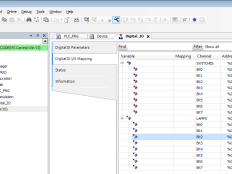
CODESYS Academy Training V3 Essentials ONLINE
Organizer / Trainer: CODESYS GmbH / Patrick Rohloff

CODESYS Academy Training V3 Advanced ONLINE
Organizer / Trainer: CODESYS GmbH / Patrick Rohloff







